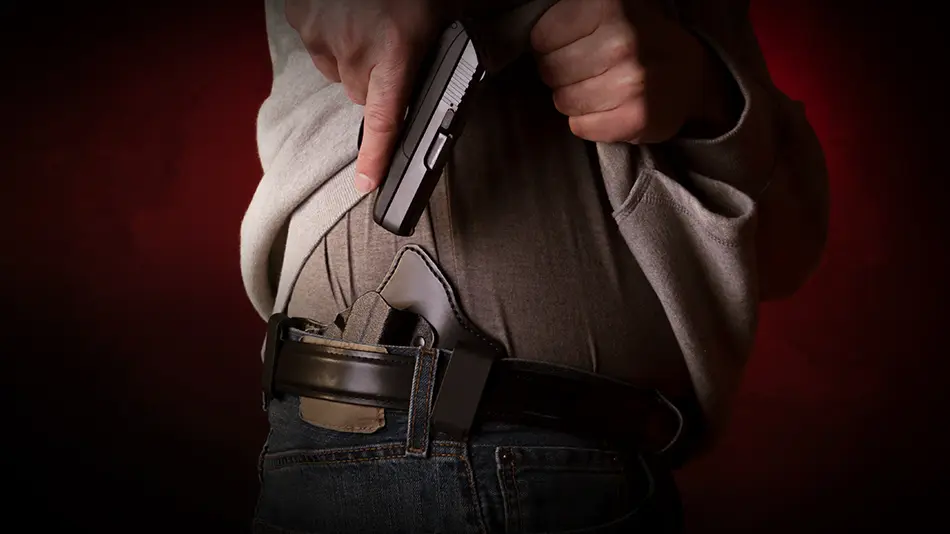Georgia is a “shall issue” Weapons Carry License state. So long as you qualify for a Weapons Carry License, the law requires the probate court judge of the county you reside in to issue a Weapons Carry License to you. But what happens when the court denies your petition for a Weapons Carry License?
Application Process
When you apply for a Weapons Carry License or a renewal license, the probate court of your county of residence must, within five days of your request, direct the proper agency to complete a criminal history check on your record, including the Federal Bureau of Investigation’s National Instant Criminal Background Check System, also called a NICS check.
According to statute, if no derogatory information is found, the judge “shall issue” the license. If, however, according to Ga. Code Ann. § 16-11-129,“facts establishing ineligibility have been reported” on any report, or the judge determines such applicant has not “met all the qualifications, is not of good moral character, or has failed to comply with any of the requirements contained in this Code section,” the Weapons Carry License is denied.
This could be a pending felony charge or felony conviction; a drug violation; or a misdemeanor crime of domestic violence. Any of these events will result in a denial of a Weapons Carry License application (and generally, possession of a firearm or ammunition).
Just as likely, however, is that the probate court has come upon information it does not understand—an old charge from another state that doesn’t fit exactly within the pattern of Georgia statutes, for instance. Maybe the court found a minor offense improperly recorded, or an order from another jurisdiction the court cannot (for whatever reason) interpret.
Even if such an event would not otherwise mandate a denial, all too often if the court cannot determine what the event is, it will deny the application out of what the judge may feel to be an “abundance of caution.”
Appealing a Denial
In such a situation, the court may allow you time to supplement the record to resolve the discrepancy. The burden will be placed on you to track down long-forgotten information, possibly in another state, to prove you are eligible for a license. This burden-shifting is not directed by the law; this is the court’s method of covering itself and, unfortunately, you may pay the price.
With an outright denial, the law prescribes a process of reconsideration. Ga. Code Ann. § 16-11-129(j) sets the process for relief from a license denial, and states as follows:
“When an applicant is otherwise denied a license, temporary renewal license, or renewal license and contends that he or she is qualified to be issued a license, …the applicant may bring an action in mandamus or other legal proceeding in order to obtain such license.”
A writ of mandamus is an order requiring an act be completed; in this case, the writ would require the probate court to issue the license. Additionally, the applicant may request a hearing before the judge of the probate court, relative to the applicant’s fitness to be issued such license (usually where you want to start: requesting a hearing before the judge who denied your application).
Upon the issuance of a denial, the judge of the probate court shall inform the applicant of his or her rights pursuant to this subsection. Here’s where it gets interesting:
“If such applicant is the prevailing party, he or she shall be entitled to recover his or her costs in such action, including reasonable attorney’s fees.”
The application process (and judicial process) behind receiving a Weapons Carry License – even in a “shall issue” state – can be really complicated. Make sure you know the steps, and if a problem arises, an attorney can assist you.
For more information concerning the Weapons Carry License process in Georgia, please call U.S. LawShield and ask to speak to your Independent Program Attorney today.





I was denied a Georgia Weapons Carry Permit when I applied for it. 27 years before I had been involved in several non-violent civil disobedience anti abortion protests. I paid a fine and did 7 days in the Atlanta City Prison Farm. I taught in Georgia public schools and the record was not a problem. I was on probation and then released from the chore of driving to Atlanta monthly to tell Ira that I was checking in and then drive back 100 miles to Columbus. Well 27 years later my carry permit was denied because they said there was an “open case” against me. I wrote a 2 page letter attesting to my good standing. I included copies of my business license, my mortgages, and noted that I had been paying Georgia income taxes since 1978 and that if any court wanted me they could easily contact me. I listed 5 references including my pastor. I then re-applied and repaid the fee and included the letter. The clerk smirked and said that letters usually don’t make a difference. Anyway I got my permit and just went back for a 5 year renewal. The same clerk was there. I could only hope she remembered me.
Thanks for your comment, John. I was just denied a Georgia WCL because of an “open case” for a bad check charge from 37 years ago. It says “disposition unknown” and “severity unknown”. I’m trying to track down information about it. Magistrate, Superior and Supreme courts all say they have no record of it. The Sheriff’s Office cannot find anything that old on the computer, so I have requested an “open records request” which apparently means someone is going down to the basement and digging through paper records. Hopefully, I can resolve the issue, but your situation gives me hope that I may be able to plead my case that I am in good standing since 1983.
I have been deniel WCL on a Dead Docket Thats 48 years ago Can some give me a course f action to take I live in Savannah the dead docket is from Augusta ga
I have/had a felony, theft by taking, from 25 years ago. ( As a teenager, charged as an adult) I just bought a gun, legally, everything went through. How do I know if I am good to go for a carry permit?
Same thing happen to me after 15 yrs of having a permit ,it was denied I talk to an attorney, she told me to reapply and if denied she will help me appeal . Evidently the judge is not reading my FOA discharge correctly.
I was denied ability to purchase a gun in ga because of an incident in fla 2007 in which i was being attacked by female i didnt even know . I was in my car – she was beating on my hood . So when she came to my drivers side window i took off. Sooooo she took out a warrant charging that i tried to run her down. I was arrested, bonded out, went to court where it was dropped – she was a no show – state dismissed it yet i guess the no contact order is in effect????? Never met her . She was not a “intimate partner “ could someone please help me . Also I HAVE HAD 2 SECURITY CLEARANCES WITH NO PROBLEMS- nothing of this b.s. ever came up on my sf86. Wtf???!!!
I was arrested in Sept of 1999…i had 3 felony charges i was acquitted on all 3 in the state of Alabama. I’m get the disposition unknown WTF! I was the only one in Alabama that year that won a case. So i gotta drive back down there from Atlanta to get the disposition papers hope’n they still have it on file from over 20 years ago?
I play guilty to a mistermeaer charge aginst my ex wife got six months probation 32years ago i have had no other issue with law infocements i m a home ownerof twenty years in my county 40 years in georgia i m i band for life
I did not receive a denial letter but I just received a letter from the probate judge saying it is necessary he speaks with me at my earliest convenience regarding my weapons carrying license application. What does this mean?
I was convicted of a felony drug trafficking charge about 20 years ago. I served 5 years in State Prison in Georgia and completed 10 years on probation. I have worked and paid taxes since then, been a model citizen. I was denied a carry license due to the felony conviction of drug trafficking. What do I need to do to be able to get the carry license since this was not a violent crime.
This is a great question. If you’re a member, please call our non-emergency line to get an answer from an independent program attorney at 877-448-6839.